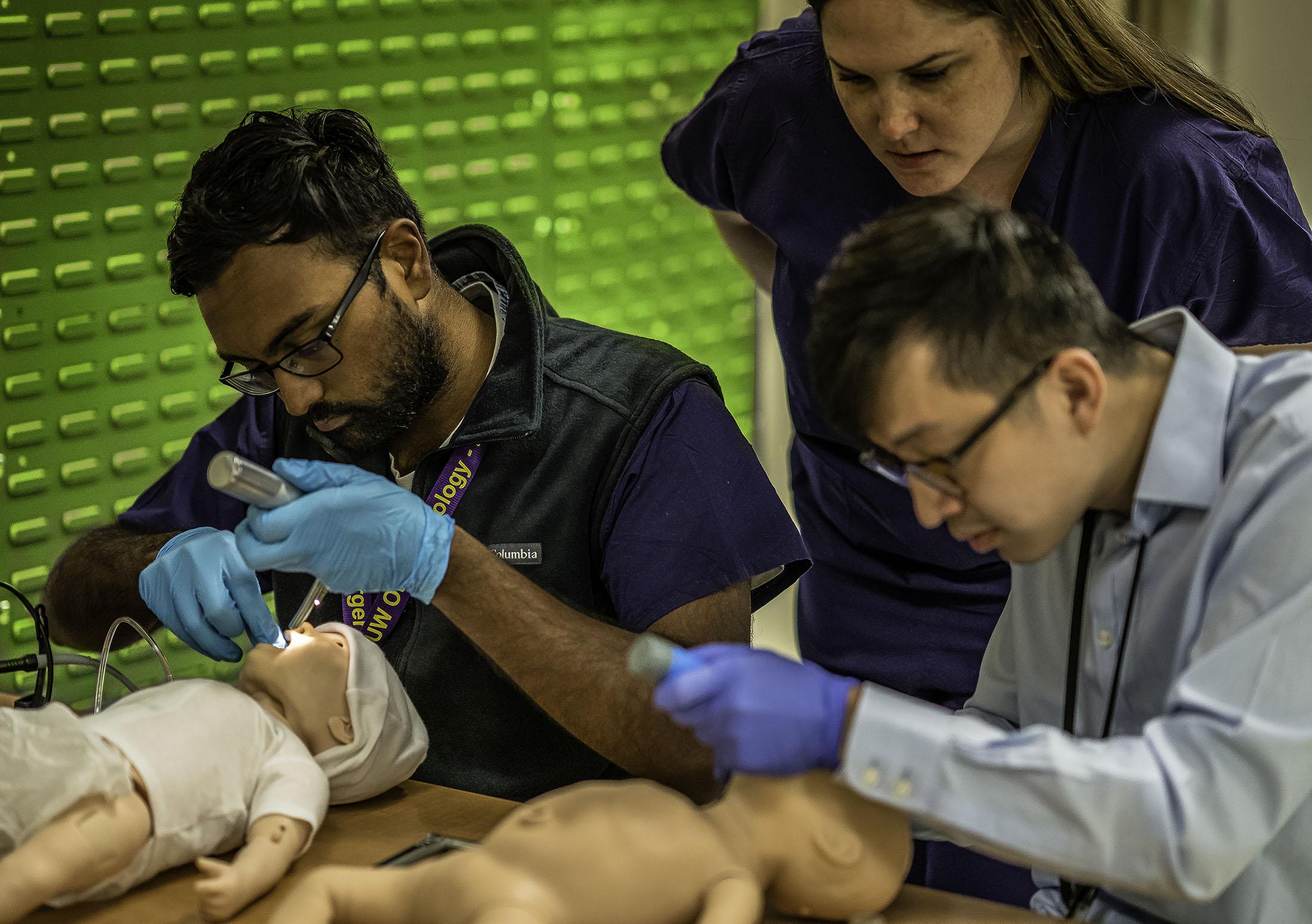Why Scheduling a Visit with an Otolaryngologist Can Help Your Health
Why Scheduling a Visit with an Otolaryngologist Can Help Your Health
Blog Article
Exploring the Field of Otolaryngology: What to Expect When You Get In Touch With an ENT
Otolaryngology, commonly referred to as ENT, incorporates the diagnosis and therapy of nose, throat, and ear disorders. For those experiencing associated problems, getting in touch with an ENT expert can supply clarity and alleviation. Comprehending what to anticipate throughout such consultations is necessary for reliable interaction and treatment. This review will certainly describe vital elements of the ENT experience, including common factors for check outs and the procedures involved in medical diagnosis and treatment.

Comprehending Otolaryngology: An Introduction
Otolaryngology, typically described as ENT (Ear, throat, and nose) medicine, is a specialized branch of medicine that concentrates on the diagnosis and therapy of problems affecting these essential locations of the human body. This area encompasses a variety of conditions, including those pertaining to hearing, balance, breathing function, and speech. Otolaryngologists are trained to manage both medical and medical treatments, utilizing sophisticated strategies and innovations. Their experience extends past conventional ailments, resolving concerns such as allergies, sinus infections, and hearing loss. Additionally, they play a crucial function in the monitoring of head and neck cancers, supplying complete care tailored to individual person needs. Generally, otolaryngology continues to be essential for keeping health and top quality of life in afflicted individuals.
Usual Factors to See an ENT Professional
Lots of individuals look for the know-how of an ENT professional for a selection of factors, mirroring the diverse nature of conditions that affect the ear, throat, and nose. Common problems include chronic sinus problems, which frequently results in consistent nasal congestion and facial discomfort. Allergies and their connected symptoms, such as sneezing and itching, additionally motivate check outs to these professionals (Otorrinolaringologia). Hearing loss, whether gradual or abrupt, is one more considerable factor for assessment. Additionally, people might look for evaluation for throat problems, consisting of persistent hoarseness or swallowing troubles. Sleep apnea, defined by disrupted breathing during sleep, is frequently dealt with by ENT experts also. Each of these conditions highlights the relevance of specialized care in managing intricate ENT-related wellness issues
Planning for Your ENT Appointment
When preparing for an ENT visit, it is necessary to collect pertinent details and think about any kind of specific worries. Clients should put together a comprehensive medical history, including previous ear, nose, or throat problems, surgical procedures, and current medicines. Documenting signs and symptoms-- such as severity, regularity, and duration-- can provide valuable insights for the ENT specialist. Additionally, individuals must prepare a listing of questions they desire to ask, guaranteeing that all problems are addressed during the check out. Bringing along any relevant medical records or test results can further aid the ENT in comprehending the individual's condition. Finally, patients must verify their visit information, consisting of time, date, and location, to lessen any type of final complication. Correct preparation can boost the effectiveness of the appointment and bring about much better outcomes.
What to Anticipate Throughout the Appointment
As the consultation starts, the individual can expect to participate in a complete conversation with the ENT expert concerning their symptoms and medical history. The professional will make inquiries about the period, frequency, and seriousness of signs and symptoms such as hearing loss, nasal blockage, or aching throat. Furthermore, the individual's previous medical problems, medicines, and any type of relevant household background will be assessed, assisting the expert in creating a full understanding of the patient's health and wellness. The ENT might likewise ask regarding way of living elements, such as direct exposure to allergens or toxic irritants. This open dialogue develops a foundation for the examination, making certain that the person's concerns are resolved and establishing the phase for any type of necessary examinations or recommendations for treatment.
Analysis Examinations and Treatments in Otolaryngology
A variety of diagnostic examinations and treatments are important in otolaryngology to properly review and diagnose conditions impacting the nose, ear, and throat. Common examinations include audiometry, which measures hearing function, and tympanometry, assessing middle ear pressure. Nasal endoscopy permits visualization of the nasal passages and sinuses, while laryngoscopy takes a look at the throat and vocal cables. Imaging strategies, such as CT scans and MRIs, supply in-depth views of head and neck frameworks. Allergic reaction testing might additionally be performed to determine triggers for sinus or respiratory system problems. These diagnostic devices make it possible for ENT professionals to establish a detailed understanding of individuals' problems, making certain customized and reliable administration strategies. Correct medical diagnosis is vital for successful treatment outcomes in otolaryngology.
Therapy Alternatives Supplied by ENT Specialists
ENT specialists provide a range of therapy options customized to address certain conditions influencing the throat, nose, and ear. These therapies range from traditional strategies, such as medication and lifestyle modifications, to more intrusive treatments. Allergies may be handled with antihistamines or immunotherapy, while persistent sinus problems may need nasal corticosteroids or sinus surgery. For hearing loss, ENT professionals usually suggest hearing help or medical treatments like cochlear implants. In situations of throat conditions, alternatives can consist of speech treatment or operations to get rid of blockages. Additionally, they might offer advice for handling rest apnea, consisting of using CPAP devices or surgical interventions. Overall, the goal is to more info improve clients' lifestyle via personalized treatment and efficient treatment methods.
When to Look For Follow-Up Treatment With an ENT
Acknowledging when to seek follow-up treatment with an ENT specialist is vital for taking care of continuous signs and symptoms or issues related to throat, ear, and nose problems. Patients need to take into consideration arranging a follow-up visit if signs and symptoms persist regardless of first therapy, such as persistent ear discomfort, nasal blockage, or throat pain. Changes in hearing, equilibrium concerns, or unusual nasal discharge may additionally necessitate more examination. Furthermore, if a person experiences negative effects from prescribed medications or has undertaken a medical procedure, follow-up treatment is very important to monitor recuperation and address any problems. Timely consultations can assure efficient administration of problems, protect against possible problems, and supply tranquility of mind pertaining to one's wellness. Looking for follow-up treatment promotes positive wellness management in otolaryngology.
Frequently Asked Questions

What Credentials Should I Seek in an ENT Specialist?
When seeking an ENT specialist, one should try to find board qualification, relevant experience, and solid patient evaluations. Additionally, effective communication abilities and a compassionate strategy can greatly boost the general therapy experience.
How Do I Pick the Right ENT for My Demands?
Choosing the best ENT expert includes assessing their certifications, experience, and patient evaluations (Hearing). It is vital to consider their communication style and approach to therapy, guaranteeing they line up with the person's specific health demands and preferences
Exist Any Type Of Risks Connected With ENT Procedures?
The dangers connected with ENT treatments might consist of infection, bleeding, anesthetic issues, and possible damage to surrounding structures. Individuals must review these threats with their physician to recognize private worries and guarantee educated choices.
How Can I Take Care Of Anxiety Before My ENT Consultation?
To take care of stress and anxiety before an appointment, people can practice deep breathing workouts, imagine positive outcomes, prepare inquiries in breakthrough, and seek assistance from buddies or household, fostering a sense of confidence and calmness.
What Should I Do if I Experience Side Impacts From Therapy?
The individual needs to immediately report them to their healthcare supplier if side impacts from treatment happen. Adjustments to treatment or added interventions may be required to ensure safety and efficiency in managing their condition - Otolaryngology. As the assessment begins, the individual can anticipate to engage in a complete conversation with the ENT expert about their signs and medical background. These diagnostic tools make it possible for ENT professionals to develop a comprehensive understanding of individuals' conditions, ensuring customized and reliable monitoring strategies. ENT specialists use a range of treatment choices tailored to deal with details conditions affecting the throat, nose, and ear. When seeking an ENT professional, one must look for board accreditation, pertinent experience, and solid patient testimonials. Selecting the ideal ENT specialist entails assessing their qualifications, experience, and individual evaluations
Report this page